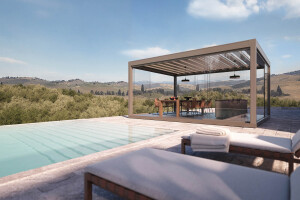The building concept of the new research building 324 for DTU, at Lyngby Campus, on the outskirts of Copenhagen is that of a ”micro-campus” with space for learning, interaction and the social environment already characterizing the campus. The 4,500 m² building will include teaching, research, administration and exhibition facilities as well as tutorial rooms and communal space for social gatherings, including an indoor garden.
Sustainable, social and technologic solutions work together. The building is designed as a low energy building using a revolutionary new hybrid ventilation system, whereby all air is transported through conventional ventilation shafts, run by a heat recovery system combining the natural flow of the air and a small support engine fitted on the roof.
Photovoltaic cells will cover 290 m2 of the roof and 460 m2 of solar thermal collectors will be placed along the south-east and west facing facades, this will provide the building with heat and electricity, making the building a zero-energy building. Glass on the south facing façade and on the roof combined with a motorized sun shield, letting the light in without overheating, will be controlled by a CTS-system. This enables a reduction of energy use for the ventilation of the building of 95 %. A key element is that the system generates heat, the system stores energy in an underground seasonal storage, surplus heat is pumped to the underground storage and during winter the building re-uses the stored heat and during the summer, the system cools down the building, via the hybrid ventilation, at no cost.
The building is heated via central district heating, using waste water from DTU´s own district heating system. The water usage is minimized by collecting rainwater, and re-using it for flushing toilets and watering the indoor plants and trees. The team has designed a building with exceptional daylight conditions, making sure that all the offices and lecture rooms have an excellent indoor climate creating a healthy work and study environment.
The new building is due to be finished in 2012.





























